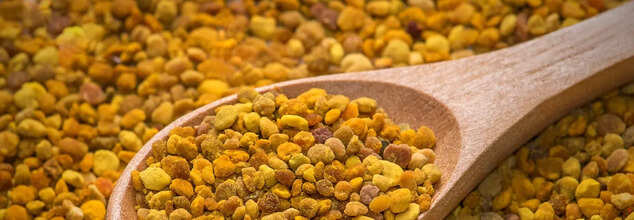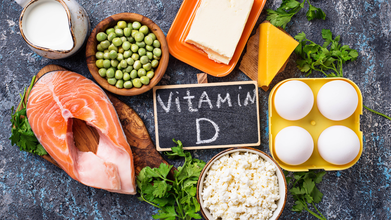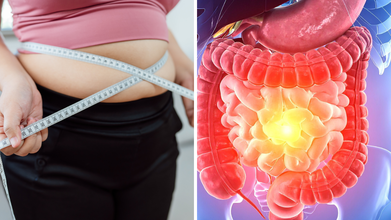- Health Conditions A-Z
- Health & Wellness
- Nutrition
- Fitness
- Health News
- Ayurveda
- Videos
- Medicine A-Z
- Parenting
What's So Special About Bee Pollen?

Bee Pollen (Credit: Canva)
Bee pollen is a mixture of flower pollen, nectar, enzymes, honey, wax, and bee secretions. Foraging honey bees collect pollen from plants and transport it to the beehive, where it's stored and used as food for the colony. In recent times, bee pollen has gained renewed traction as more and more are discovering its health benefits.
Here Are Surprising Health Benefits Of Bee Pollen
1. Packed With 250 Biologically Active Substances
Bee pollen boasts an impressive nutritional profile. It contains over 250 biologically active substances, that includes proteins, carbohydrates, lipids, fatty acids, vitamins and minerals. Besides, it is also packed with enzymes, antibiotics and antioxidants. Interestingly, this nutritional profile of bee pollen is variable and depends on the plant source and season collected.
2. Antioxidant Properties
It is loaded with antioxidants like flavonoids and carotenoids, which help combat free radicals, reducing the risk of chronic diseases such as diabetes and cancer. A study published in the journal Evidence-Based Complementary and Alternative Medicine found that bee pollen antioxidants can reduce chronic inflammation, eliminate harmful bacteria, fight infections, and combat the growth and spread of tumours.
3. Heart Health
There is empirical evidence that states that bee pollen reduces high blood lipids and cholestrols. Two studies conducted on animals in 2017 and 2018 showed that bee pollen extracts can lower blood cholesterol levels, especially LDL (bad) cholesterol.
4. Liver Protection
Bee pollen also protects the liver from all kinds of toxins and promotes recovery from liver damage. Empirical evidence suggests that bee pollen can act as an effective treatment against conditions like hepatitis and nonalcoholic fatty liver disease.
5. Anti-inflammatory Effects
Research shows that bee pollen contains compounds like quercetin, which reduce inflammation and may be an alternative to Nonsteroidal anti-inflammatory drugs (NSAIDs). Bee pollen packs several compounds that can reduce inflammation and swelling, including the antioxidant quercetin.
6. Immune Boost
Bee pollen exhibits antimicrobial properties, potentially protecting against harmful bacteria and boosting immunity.
7. Wound Healing
With anti-inflammatory and antimicrobial properties, bee pollen may aid in wound healing and prevent infections. Bee pollen work by reducing excessive inflammation at the wound site, allowing the body to focus on tissue repair and collagen production.
8. Potential Anti-Cancer Effects
Test-tube studies suggest bee pollen may inhibit tumour growth and promote cancer cell death, though human studies are limited.
9. Menopausal Relief
Some studies indicate that bee pollen may alleviate menopausal symptoms like hot flashes, though more research is needed.
Besides bee pollen, another related product that holds immense nutritional value is honey. It is a naturally sweet, syrup-like substance that bees produce from the nectar of flowering plants. The bees collect the nectar and then consume, digest, and regurgitate it inside the beehive to produce honey. This honey is stored in wax structures called honeycombs, which are gathered by humans through the practice of beekeeping. Although the nutritional value of honey. A single tablespoon (21 grams) of honey typically consists of 64 calories and 17 grams of carbs with little to no fat, fibre, and protein.
ALSO READ: Is Honey Good Or Bad For You?
Is February Feeling Gloomy Without Sunlight? Add These Foods In Your Diet To Avoid Vitamin D Deficiency

Credits: Canva
February often feels like winter’s longest stretch. The days are short, the sun rarely breaks through the clouds, and many people find themselves feeling unusually tired or low. Health experts say this is also the time of year when vitamin D deficiency tends to surface, especially in regions with limited winter sunlight.
While vitamin D is best known for its role in bone health, its impact goes far beyond that. As sunlight exposure drops in late winter, attention is turning to how diet can help support the body until brighter days return.
Why Vitamin D Matters for the Body
Vitamin D plays a key role in several essential functions. It helps the body absorb calcium, which is crucial for maintaining strong bones and teeth. It also supports normal muscle function and keeps the immune system working efficiently.
What is less widely discussed is its role in brain health. Vitamin D receptors are present in many areas of the brain, and low levels have been linked to changes in mood and energy. During winter, many people report feeling sluggish, unmotivated, or emotionally flat. While these symptoms are often blamed on stress or lack of sleep, reduced sunlight and falling vitamin D levels may also contribute.
Why Winter Increases the Risk of Deficiency
The body produces most of its vitamin D when the skin is exposed to sunlight. In winter, shorter days, heavy clothing, and more time spent indoors mean that this natural process slows down significantly. Even people who eat well can struggle to maintain optimal levels during prolonged periods of low sun exposure.
This is where food choices can offer some support, even if they cannot fully replace sunlight.
Fatty Fish as a Natural Boost
Salmon is one of the richest natural sources of vitamin D. It also provides high quality protein and healthy fats that support heart and brain health. Simple meals like oven baked salmon with potatoes and broccoli or a salmon rice bowl with vegetables make it easy to include in weekly meals.
Herring is another strong option. It contains both vitamin D and omega 3 fatty acids, which are known to support heart health. Traditional combinations such as herring with boiled potatoes or a light yogurt based sauce are both nourishing and filling.
Everyday Foods That Add Up
Eggs also contribute small amounts of vitamin D, mainly from the yolk. While they do not provide as much as fatty fish, they are easy to include in daily meals. Scrambled eggs, vegetable omelettes, or a soft boiled egg at dinner can all help increase intake over time.
Mushrooms are one of the few plant based foods that contain vitamin D, especially when they have been exposed to light. They are not a replacement for fish but can be a helpful addition for those who eat little or no seafood.
Food Helps, but Sunlight Still Matters
Nutrition can support vitamin D levels during winter, but it cannot fully make up for the lack of sunlight. Most vitamin D is still produced through the skin, not the diet. Experts advise making the most of daylight when possible, even short walks outdoors, while using food as a supportive measure until spring arrives.
Expert Reveals Why You Keep Gaining Weight Despite Barely Eating

(Photos: Canva)
Recent insights from medical experts show that even people who eat very less can gain weight due muscle mass, stress, and their body’s movement during the day.
Dr Mohit Bhandari, a robotic bariatric and endoscopic weight loss surgeon, founder and director of Mohak Bariatrics and Robotics at Bhandari Hospital Indore notes some people eat whatever they want without gaining weight, while others struggle even with dieting.
The secret lies in the complex interplay of genetics, metabolism, and environmental factors that influence weight management.
This is why are you are putting on weight, according to Dr Bhandari:
1. Metabolism Differences
Studies have shown that metabolic factors are involved in the development of obesity and that being overweight is not simply a result of "sloth and gluttony."The speed at which the body burns calories is different for every individual. A slower metabolism means that even consuming small amount of food can lead to gain.
Individuals with high level of physical activity are less likely to be obese as they mean calories quicker.
2. Hormonal And Lifestyle Factors
Many women experience weight gain during menopause due to a drop in estrogen levels and subsequently fat distribution. This can lead to risk of heart diseases, Type-2 diabetes and joint problems.Hormones like thyroid hormones, cortisol, and play a major role in weight regulation. Stress, lack of sleep and Insulin sensitivity are also factors that lead to fat storage in the body.
3. Loss Of Muscle Mass
When muscle mass decreases due to ageing, inactivity or illness, it often causes a decline in physical activity, which further lowers daily energy expenditure.Consuming a snack rich in carbohydrate with 10-20 grams of protein before and immediately after strength training sessions further acts as a responsible factor in gaining weight.
4. Gut Health And Digestion
Poor digestion can also trigger inflammation, which interferes with blood sugar levels.Additionally, it can also trigger inflammation, which interferes with normal metabolism and insulin function, encouraging fat storage.
Why You Should Be Performing This Exercise Instead Of Lifting Weights

(Photos: Canva)
People are switching from weightlifting and training in the gym to real world strength training.
By strengthening multiple muscle groups at once, it enhances balance, posture, and overall physical efficiency. And one of the best ways to do this is by adopting the farmer's walk
What Is Farmer’s Walk?
Farmer’s Walk is a functional movement that involves picking up weights, maintaining a rigid posture, and walking with controlled steps, mimicking carrying heavy loads in daily life.Here’s Why Farmer’s Walk Has Gained Popularity:
1. Builds Body strength
Carrying heavy weights while walking strengthens the hands, forearms and wrist which directly support grip for other exercises.Meanwhile, the legs including the quadriceps and hamstrings support the lower body’s endurance.
2. Improves Balance And Posture
In terms of balance, carrying loads requires an upright posture. This enhances gait (heel strike of one foot to the next heel strike of that same foot) stability which reduces the chances of injury during weightliftingOverall, this exercise also regulates spinal and musculoskeletal health.
3. Supports Recovery
The Farmer’s Walk is an effective post injury and post-surgery recovery strategy due its scalable nature (weight adjusted to individual’s capacity).It can rebuild strength and stabilize mobility without exceeding tissue healing thresholds.
4. Time Efficient
Furthermore, this exercise provides a full body workout without spending hours in the gym.It can help build strength, improve balance, and boost endurance all at the same time by ensuing coordination among different muscles of the body, making it useful for physical therapy and everyday fitness.
5. Proper Diet and Care It is crucial to fuel your body and make it ready for such a comprehensive exercise.
Proteins such as legumes, tofu and supplements support muscle repair and growth making them an excellent source.
Hydration is the key factor that prevents fatigue and muscle cramps.
Before any extensive workout, warm up thoroughly with light cardio or stretching for about 15-20 minutes.
© 2024 Bennett, Coleman & Company Limited

